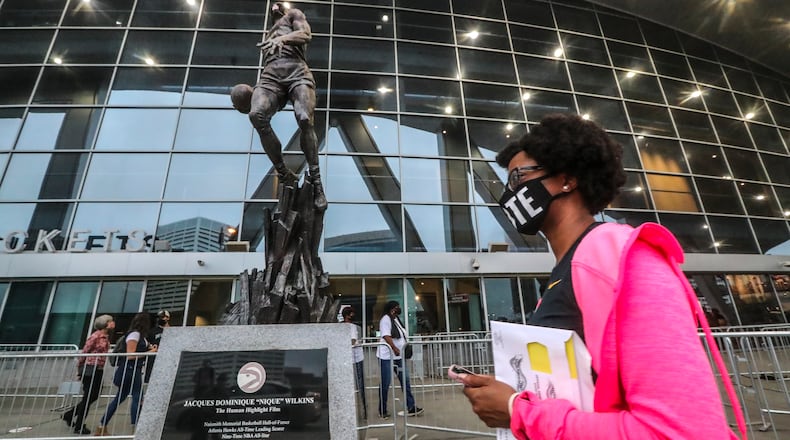David Carroll has been working with the Carter Center observing and monitoring elections in Third World countries for 30 years.
In each of the 111 observations in 39 countries, a few things consistently stick out.
Deep ideological polarization. Ethnic and racial divisions. Little confidence in election integrity. Results not accepted.
Sounds like America, 2020.
As the country barrels toward one of the most contentious elections in American history, already dripping with tension about the whole voting process, the Atlanta-based Carter Center is taking the unprecedented step to get involved in U.S. elections.
“The characteristics of politics on this country are not unlike what we see in other countries,” Carroll said. “Those are the types of things we see in countries where democracy is really struggling.”
At this late date, with the United States being a patchwork of about 10,000 individual jurisdictions across 50 states with no centralized election administration, it would be almost impossible for the Carter Center to monitor elections here. There also would be perceptions of bias because it was founded by a former Democratic Party president.
The Carter Center is in discussion with some states, including Georgia, about small-scale, targeted observation efforts on specific aspects of the process, but stopping short of full-fledged monitoring.
The Carter Center also will implement a public information campaign to enhance public knowledge and build confidence in the American election process.
“We are focusing on trust and transparency, how to increase understanding of the election, how the election process is working and how the absentee process is working,” Carroll said. “All with the idea of addressing distrust and lack of confidence.”
Credit: DEBORAH HAKES
Credit: DEBORAH HAKES
The organization founded by former President Jimmy Carter has long been involved in elections across Latin America, the Middle East and Africa. Currently, teams are working in Côte d’Ivoire, Myanmar and Bolivia.
“It is hard for the Carter Center, which has done human rights work overseas, not to look in our backyard,” said Carter Center CEO Paige Alexander. “Something that we have learned is that you ensure good elections by increasing public knowledge. We just need to bring that back home.”
The Carter Center is generally invited to work in countries that are either “poised to take a step forward or in danger of taking a step backward,” Carroll said.
Carroll said America is on the brink of backsliding, something he could not have envisioned when the Carter Center’s program started.
“Until the last five or 10 years — though the U.S. was far from perfect — it didn’t fit that category,” Carroll said. “I started to get more concerned about polarization, especially over the last four or five years. Nothing that can compare to what we are seeing in my experience in the United States.”
In Georgia on Monday, long lines greeted voters on the first day of early voting, offering a snapshot of national issues like access to polling places and the security of voting equipment.
In addition, President Donald Trump, who is trailing in the polls to former Vice President Joe Biden, has repeatedly questioned the integrity of the election, alleging a proliferation of mail-in voting will cause widespread fraud. More people are voting by mail amid a coronavirus pandemic that has killed nearly 220,000 Americans.
Credit: Ben Gray
Credit: Ben Gray
“U.S. elections have never been perfect, but generally Americans trusted in the process and believed in the results,” said Avery Davis-Roberts, an associate director in the Carter Center’s Democracy Program.
Among the Carter Center’s election efforts in the U.S.:
- Producing two animated videos – one that lays out voting options and another that focuses on the need for patience after election day, as the large number of mailed ballots will likely delay the results of the election.
- Working with nonpartisan or bipartisan groups to produce and distribute a number of reports, fact sheets, opinion pieces, and articles on various aspects of the electoral process. Along with the National Conference of State Legislatures, the Carter Center developed a 37-page roundup of the policies governing election observers in all 50 states. It teamed up with the National Vote at Home Initiative to produce a report and webinar on how local election officials can make the absentee ballot process more transparent.
- Offering training for journalists on transparency and international election standards.
- Hosting free virtual public conversations about voting. Last week, CNN correspondent Suzanne Malveaux hosted a virtual conversation with the former U.S. Secretary of Homeland Security Michael Chertoff; Kevin Johnson, a senior member of the Carter Center’s U.S. Election Expert Team; and Jennifer Morrell, a partner at The Elections Group.
Credit: Carter Center/Annemarie Poyo Fur
Credit: Carter Center/Annemarie Poyo Fur
“We’re not naïve — there are real problems in 2020, and we plan to speak out about them when we think we can make a difference," Carroll said. "But there are also some pretty good systems and safeguards in place, and we want people to know about those, too.”
--Reporter Mark Niesse contributed to this article.
About the Author







